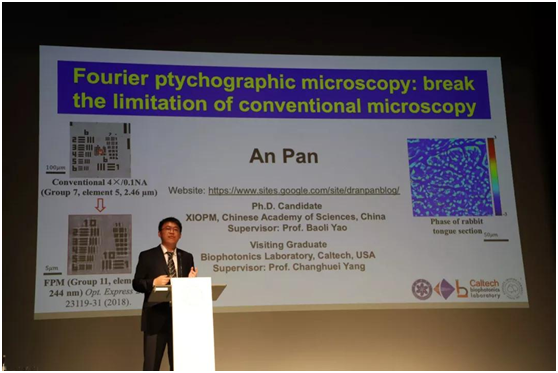The 69th Lindau Nobel Laureate Meetings in Germany closed on the afternoon of July 5th (Beijing standard time). 1st Place Poster Award was won by An Pan, a Ph.D. candidate from Xi'an Institute of Optics and Precision Mechanics CAS.

1st Place Poster Award certificate of An Pan. Photo: An Pan
An Pan made innovative work in the field of Fourier ptychographic microscopy, which is a promising high-resolution (HR) and large field-of-view (FOV) imaging technique that reported in recent years. It simultaneously tackles four significant problems in conventional microscopy: phase loss, aberration-introduced artifact, narrow depth of field (DOF) and the tradeoff between resolution and FOV.

A short presentation was given by An Pan during Lindau Nobel Laureate Meetings. Photo: An Pan
Every year, posters session is open to young scientists, but the competition is extremely severe. This year more than 60% of young scientists submitted their abstracts and only 30 posters are selected and displayed during the whole meetings. The organizers paid great attention to this session and provided professional training for the 30 candidates on the evening of the opening ceremony.
Since year 1951, Nobel Laureate Meeting has been held once a year in Lindau, Germany, inviting Nobel Prize Winners and global outstanding young scientists, which has been 69 sessions so far.
Mr. An Pan of our institute was selected from thousands of applicants and was eligible to acquire the qualification to participate in the 69th Lindau Nobel laureate Meeting as one of the 25 young scientists from China. The theme of this year’ Lindau Nobel Laureate Meetings is physics. 40 Nobel laureates in total and 600 young scientists from 89 countries attended the meetings.
German Lindau Nobel Laureate Meeting has incredible attraction for young scientists from all over the world. China has organized and selected young scientists to participate the fantastic meeting since year 2004.

Group photo of selected Chines Ph.D. candidates for 69th Lindau Nobel Laureate Meetings.Photo: Sino-German Science Center
Download: